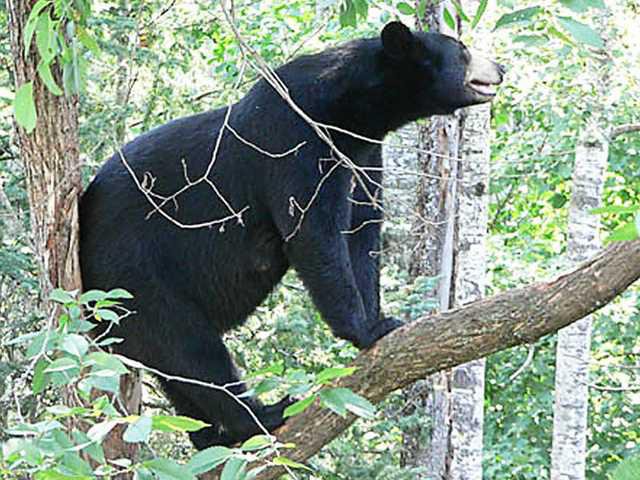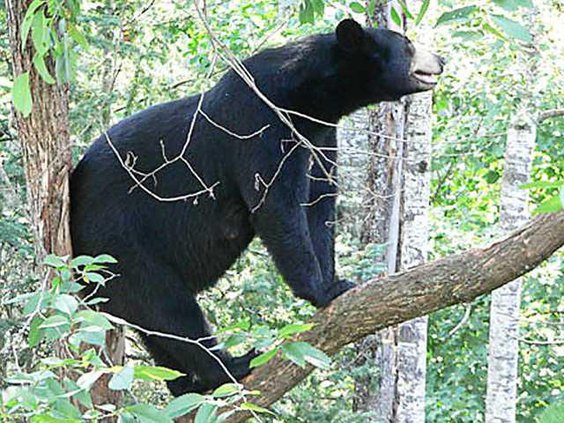MACON — About a tenth of the Middle Georgia black bear population was killed when the first-ever open bear season was held in three Middle Georgia counties last month. Although some wildlife advocates are raising concerns about harm to the bear population, state officials say the hunt will be held the same way next year.
A population of about 300 bears, centered in Houston and Twiggs counties, was a key driver behind Georgia's $29 million purchase of 10,000 acres of the Oaky Woods Wildlife Management area in Houston County a year ago. But as both bear and human populations grow, the state Department of Natural Resources has fielded an increasing number of complaints about nuisance bears from residents of Houston and Bibb counties.
For more than a decade, hunters competed for permits to participate in a quota bear hunt at the Ocmulgee Wildlife Management Area in Twiggs and Bleckley counties. In recent years, that hunt was moved from December to November, when bears are more active. On average, one bear was shot there every three years, said Bobby Bond, a senior wildlife biologist and specialist on Middle Georgia's bears for the DNR.
But this year, after a public comment period, the state settled on a one-day open season on private lands in Bibb, Houston and Twiggs counties.
Thirty-four bears were killed Nov. 12, half of them females, and all in an area near Tarversville in Twiggs County, Bond said.
"We killed too many bears, especially females," said John Trussell, an outdoor writer and founder of Save Oaky Woods. "There were too many hunters in that area, and there was a lot of baiting going on in that area. ... We shouldn't have a bunch of folks crowding into one small spot and shooting every bear that walks across."
Trussell, a longtime hunter, contends that the state should switch to a quota system and perhaps shift the hunt back to December to protect more female bears.
"It's taken us 100 years to get where we're at," he said. "It's better to start slow."
Six bears were killed at a single hunt club. Other hunt clubs had three and two bears harvested, Bond said.
"Anytime you get six bears on one property, that's a lot," DNR ranger Cpl. Robert Stillwell said.
Bond said the most bears ever harvested in one day at the Ocmulgee WMA quota hunts was two. He said the only time he has ever heard of bears congregating is around food sources, such as in fields where peanuts are being harvested.
Hunting bears over bait is a misdemeanor "of a high and aggravated nature." DNR rangers issued six citations related to two bears killed by hunters who were using bait, Stillwell said.
He said the illegally shot bears included the largest bear killed that day, a 436-pound male, and a 250-pound male. Rangers caught hunters in the act on two different leased properties.
Each citation for hunting bears over bait can involve fines of up to $1,500 plus restitution of up to $1,500, but the penalty will be up to a judge in Twiggs County Probate Court, Stillwell said.
He said next year there will be more rangers patrolling the hunt, which attracted as many as 40 or 50 hunters to hunt clubs with a few thousand acres. Some landowners charged $300 or $400 for one-day hunting rights on their land, he said.
Stillwell said hunting bear over bait is harder to prove without a tip, now that Georgia has legalized hunting deer over bait. He said a hunter can claim that the bait was intended for deer, even if it's dog food with honey poured over it.
"If we find a place (like that), then we'd know to go back there and check," he said. "But in some instances, you have to wait for a bear to be killed to get them. That bothers me. My job is to protect the bears. ... So it's harder with having the baiting laws legalized, for sure."
Bond said hunters in Twiggs County have been clamoring for a bear hunt there for years, and in a recent opinion survey most participants favored hunting them. Comments to DNR were overwhelmingly positive when the open season hunt was proposed, said John Bowers, DNR's assistant chief for game management.
The hunt was also intended to cut down on conflicts between bears and humans in Houston and Bibb counties -- where no bears were actually killed.
"We were getting to the point where we were getting more and more bear complaints and more showing up where they shouldn't be and getting habituated to humans," Bond said. "We thought (the hunt) would help increase their fear of humans."
Bond expressed surprise that so many bears were killed in such a small area and that none were killed in Houston County -- although one was shot there that wasn't recovered, he said.
"As long as you don't go over 10 percent of your population (harvested by hunters), you're OK," Bond said. "But for Twiggs County, it might be kind of concerning to lose 17 females."
"That's an awful lot of bears to be killing out of one place," Stillwell said. "It's not as if we have thousands and thousands of bears like we do deer."
Trussell argues that if the rules aren't changed, "the harvest is going to increase next year, probably by a harmful amount."
He thinks Georgia should follow the example of South Carolina, which allowed its first bear hunt in three coastal counties this month. According to The State newspaper in Columbia, a quota system was used to permit just 30 hunters to have a shot at the population of 500 or so bears over the course of several weeks.
Georgia's hunting seasons and rules are determined on a two-year cycle and won't change before next year's hunt Nov. 10, Bowers said.
"We're pleased with the harvest that was achieved," he said. "It fell right in line with what we anticipated. The number of females was a little higher than we would like, but is not of great concern to us."
Bowers said the bears' core habitat on the wildlife management acted as a preserve, since it wasn't hunted.
But a large portion of the land that was once part of that preserve has fallen into private hands, and in many cases is leased for hunting, Trussell pointed out. About 7,000 acres each of the Ocmulgee and Oaky Woods wildlife management areas has gone into private hands since 1994.
Trussell said the 7,000 acres of Oaky Woods that Georgia stopped leasing this fall is being advertised for hunting leases now, and he expects far more hunters -- many from out of state -- to be taking aim at bears next November.
Bowers said the DNR will consider the rules again only after it has two years of data.
That data is likely to be enhanced by a new bear survey being conducted by the University of Georgia with funding from DNR and the Georgia Department of Transportation, which will be widening Ga. 96 in the heart of the bears' territory. Underpasses for the bears are built into the highway plans, and officials want to gather information on bear movement patterns to pick the best spots, Bond said.
He said bears will be caught and radio collared, as they were in several previous studies. (Two of the bears killed last month were part of the most recent study.) Wildlife officials hope to learn more about the bear population size, reproductive habits and den sites, Bond said
Bowers said that study is starting now and will conclude in 2014.
34 Ga. bears killed
Hunt raises concerns among wildlife advocates


Sign up for the Herald's free e-newsletter